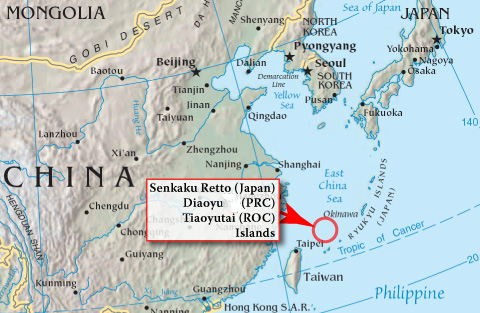Ganelon wrote:The only confirmable fact is that as with many late 20th/early 21st century's international problems, the Diaoyu/Senkaku issue can be directly traced to western tampering during the era of expansionism.
Hmm... I'm not going to go too far into this as I'll admit, most of my exposure to it is what's ALL OVER the fucking news 24/7 here. But, I assume Japan "claimed" the islands at the conclusion of the 2nd Sino-Japan War. America operated on it during the occupational forces, and then kinda-sorta gave it back. I assume that China thinks that sense most land that the Empire of Japan attained through aggression was eventually given back, the islands would be too. That's a horrible simplification, but it can't be too far off.
The US is smart to stay far away from the mess that it helped start. If it even hints at supporting Japan, then I'd bet the next flag getting stomped and burned by a Chinese nationalist mob will be America's.
I would have to dig it up as it was over a year ago, but they have gone on the record saying to China that they would have to side with their ally Japan on any territorial dispute. So, I doubt America is going to be invited to the discussion table, but we'll see. China really does hold the cards here though, although Japan could threaten to treat all Chinese residing in Japan with racial bigotry and deep-seeded hatret. Oh, wait...

Next question: Takeshima or Dokdo?
EDIT: Went on a little Wikipedia adventure and found the following on the lengthy page discussing
The Treaty of San Francisco.
Article 3 of the treaty left the Bonin Islands and the Ryukyu Islands, which included Okinawa and the Amami, Miyako and Yaeyama Islands groups, under a potential U.S. trusteeship. Whilst the treaty suggested that these territories would become U.S. trusteeship, at the end that option was not pursued. The Amami Islands were eventually restored to Japan on December 25, 1953, as well as the Bonin Islands on April 5, 1968.[15] In 1969 U.S.-Japan negotiations authorized the transfer of authority over the Ryūkyūs to Japan to be implemented in 1972. In 1972, the United States "reversion" of the Ryūkyūs occurred along with the ceding of control over the nearby (uninhabited) Senkaku Islands.[16] Both the People's Republic of China and the Republic of China, now commonly known as "Taiwan", argue that this agreement did not determine the ultimate sovereignty of the Senkaku Islands.
It stated earlier that China and Taiwan were not at the convention due to ongoing civil war. The Soviets were there and were none-to-pleased with the outcome. Tsk, tsk.


